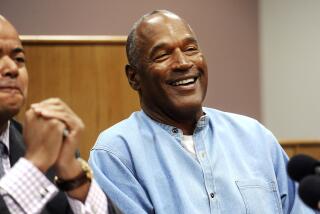THE SIMPSON MURDER CASE : Picture of a ‘Lost Person’ : Psychologists Say Simpson’s Letter and Flight Reflect His Troubled State of Mind
- Share via
A goodby letter in which he proclaims his innocence and love for the former wife he is accused of killing. A hasty escape as the police close in. An aimless freeway drive that eventually takes him back home. A gun pointed at his own head. Repeated demands to see his mother.
The bizarre litany of puzzling actions by football great-turned-murder suspect O.J. Simpson reveals a man out of control, in denial, on the verge of killing himself and genuinely distraught over the death of Nicole Brown Simpson--even if he was responsible for it, said psychiatrists and psychologists Saturday.
These experts said Simpson’s behavior Friday suggests a personality that is impulsive--one that may react instead of thinking things through in a deliberate way.
This impulsiveness could have enhanced Simpson’s prowess on the football field, which required him to act quickly, almost without thinking.
And it could explain why Simpson suddenly took flight Friday, turning fugitive for 10 hours after cooperating with authorities all week.
“This is the behavior of a man who didn’t know what he was doing,” said one Los Angeles psychologist, who did not want to be identified. “There was no plan there. There was no deliberateness. There was going from point to point, moment to moment, a certain lack of will.”
Yet it may have been Simpson himself who offered the best summation of his state of mind Friday. In a poignant letter to the public, read aloud on television, the man many called the greatest running back of all time described himself sadly as “this lost person.”
The letter was a classic suicide note, most experts said. There were telltale clues: Simpson spoke of himself in the past tense. (“I’ve had a good life.”) He declared himself unable to continue. (“I can’t go on.”) He tried to ensure a good future for his children. (“Please . . . let my kids live in peace.”)
“This is definitely a suicide note, and I think it was because of two fantasies” that he appeared to have, said Dr. Carole Lieberman, UCLA professor of clinical psychiatry who specializes in issues of celebrity. “One was to rejoin his wife in death and the other was to leave the question of his culpability ambiguous to protect his children.”
Said Michael Peck, a clinical psychologist who worked for 20 years with the now-defunct Los Angeles Suicide Prevention Center: “The note is a suicide note, except for the fact that he didn’t commit suicide.”
But the note reveals ambivalence, Peck and others said. It offers personal thank-yous to many of his friends, indicating that Simpson knew that he was loved by many. Knowing that one’s own death would hurt others is often a crucial factor in preventing suicide.
Experts also said Simpson received crucial support from his friend and former teammate, Al Cowlings--who may have broken the law to help his childhood buddy. It was Cowlings who helped Simpson escape a San Fernando Valley house just as police were about to arrest him in last week’s slaying of Nicole Brown Simpson and her friend, Ronald Lyle Goldman. And it was Cowlings who drove Simpson for hours along Southern California’s freeways in perhaps the most gripping police pursuit in Los Angeles history.
Cowlings, Peck said, “may very well have saved (Simpson’s) life.”
Then again, Simpson may not have intended to kill himself at all, said Lilli Friedland, a Century City psychologist. Friedland said Simpson, through his letter, may simply have been coming to grips with the fact that his life will never be the same.
“It was really goodby to the life of super-hero,” Friedland said. “I think what we started seeing was the disintegration of his public persona, his super-hero facade. I think he was witnessing that, while medicated and while incredibly distraught.” (Simpson’s lawyer has said he was taking antidepressant drugs.)
Both Lieberman, the UCLA psychiatrist, and Friedland said Simpson’s actions also fit squarely with the pattern of an abusive spouse who turns violent as a means of controlling a woman he loves and feels powerless over.
He wrote in his letter that he sometimes felt “like a battered husband”--an indication that she may have hurt him deeply. And he opened the letter by declaring his love for Nicole, saying, “If we had a problem, it’s because I loved her so much.”
That remark, Lieberman said, “is a typical line of what a wife abuser would say. You could take that from a script. These men don’t see it as hating their wives, they see it as being so in love with their wives that they don’t want their wives to abandon them.”
Also telling, Lieberman said, was Simpson’s request to see his mother--another extremely important woman in his life--at a time when his wife was gone. “His wife is dead,” she said. “The object of his desire is dead. So his very worst fears came true, whether it was his fault or not.”
The experts said it is unlikely that Simpson staged Friday’s events in a calculated attempt to gain public sympathy or help his own defense by making himself seem mentally unbalanced.
“I doubt that he would have thought clearly enough to plan that out,” said Peck. “Whether he did it or not, he was in terrible shape. I think he was very distraught, one way or the other, and I think that was clear to everybody who knew him.”
More to Read
Sign up for Essential California
The most important California stories and recommendations in your inbox every morning.
You may occasionally receive promotional content from the Los Angeles Times.













